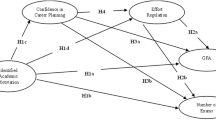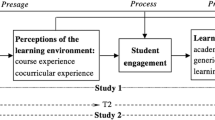Abstract
This study investigated the relationship between multiple predictors of academic achievement, including course experience, students’ approaches to learning (SAL), effort (amount of time spent on studying) and prior academic performance (high school grade point average—HSGPA) among 442 first semester undergraduate psychology students. Correlation analysis showed that all of these factors were related to first semester examination grade in psychology. Profile analyses showed significant mean level differences between subgroups of students. A structural equation model showed that surface and strategic approaches to learning were mediators between course experience and exam performance. This model also showed that SAL, effort and HSGPA were independent predictors of exam performance, also when controlling for the effect of the other predictors. Hence, academic performance is both indirectly affected by the learning context as experienced by the students and directly affected by the students’ effort, prior performance and approaches to learning.




Similar content being viewed by others
References
Arbuckle, J. L. (1999). AMOS users’ guide version 4.0. Chicago: SPSS Corporation.
Bentler, P. M. (1990). Comparative fit indexes in structural models. Psychological Bulletin, 107, 238–246.
Biggs, J. (1999). Teaching for quality learning at university. Buckingham: Open UP and SRHE.
Biggs, J. (2001). Enhancing learning: A matter of style or approach? In R. J. Sternberg & L. F. Zhang (Eds.), Perspectives on thinking, learning, and cognitive styles (pp. 73–103). London: Lawrence Erlbaum.
Biggs, J. B. (2003). Teaching for quality learning at university. UK: SRHE and Open University Press.
Browne, M. W., & Cudeck, R. (1993). Alternative ways of assessing model fit. In K. A. Bollen & J. S. Long (Eds.), Testing structural equation models (pp. 445–455). Newbury Park, CA: Sage.
Byrne, B. M. (2001). Structural equation modelling with AMOS. Basic concepts, applications, and programming. London: Lawrence Erlbaum.
Byrne, M., & Flood, B. (2003). Assessing the teaching quality of accounting programmes: An evaluation of the course experience questionnaire. Assessment & Evaluation in Higher Education, 28, 135–145.
Cano, F. (2005). Epistemological beliefs and approaches to learning: Their change through secondary school and their influence on academic performance. British Journal of Educational Psychology, 75, 203–221.
Cavell, T. A., & Woehr, D. J. (1994). Predicting introductory psychology test scores: An engaging and useful topic. Teaching of Psychology, 21, 108–110.
Coffield, F., Moseley, D., Hall, E., & Ecclestone, K. (2004). Should we be using learning styles? What research has to say to practice. London: Learning and Skills Research Centre.
Cohen, J. (1988). Statistical power analysis for the behavioral sciences (2nd ed.). Hillsdale, NJ: Lawrence Erlbaum.
Diseth, Å. (2001). Validation of a Norwegian version of the approaches and study skills inventory for students (ASSIST): Application of structural equation modelling. Scandinavian Journal of Educational Research, 45, 381–394.
Diseth, Å. (2003). Personality and approaches to learning as predictors of academic achievement. European Journal of Personality, 17, 143–155.
Diseth, Å. (2007). Approaches to learning, course experience and examination grade among undergraduate psychology students: Testing of mediator effects and construct validity. Studies in Higher Education, 32, 373–388.
Diseth, Å., Pallesen, S., Hovland, A., & Larsen, S. (2006). Course experience, approaches to learning and academic achievement. Education and Training, 48, 156–169.
Duff, A. (2003). Quality of learning on an MBA programme: the impact of approaches to learning on academic performance. Educational Psychology, 23, 127–139.
Entwistle, N. (1987). A model of the teaching–learning process. In J. T. E. Richardson, M. W. Eysenck, & D. Warren Piper (Eds.), Improving learning: New perspectives (pp. 178–198). London: Kogan Page.
Entwistle, N. J. (1997). The approaches and study skills inventory for students (ASSIST). Edinburgh: Centre for Research on Learning and Instruction, University of Edinburgh.
Entwistle, N., & Ramsden, P. (1983). Understanding student learning. London: Croom Helm.
Entwistle, N., & Smith, C. (2002). Personal understanding and target understanding: Mapping influences on the outcomes of learning. British Journal of Educational Psychology, 72, 321–342.
Entwistle, N., & Tait, H. (1990). Approaches to learning, evaluation of teaching, and preferences for contrasting academic environments. Higher Education, 19, 169–194.
Entwistle, N., Tait, H., & McCune, V. (2000). Patterns of response to an approaches to studying inventory across contrasting groups and contexts. European Journal of Psychology of Education, 15, 33–48.
Fan, X., Wang, L., & Thompson, B. (1999). Effects of sample size, estimation method, and model specification on structural equation modeling fit indexes. Structural Equation Modeling, 6, 56–83.
Honkimäki, S., Tynjälä, P., & Valkonen, S. (2004). University students’ study orientations, learning experiences and study success in innovative courses. Studies in Higher Education, 29, 431–449.
Hu, L.-T., & Bentler, P. M. (1995). Evaluating model fit. In R. H. Hoyle (Ed.), Structural equation modelling: Concepts, issues, and applications (pp. 76–99). Thousand Oaks, CA: Sage.
Jöreskog, K. G. (1993). Testing structural equation models. In K. A. Bollen & J. S. Long (Eds.), Testing structural equation models (pp. 294–317). Newbury Park, CA: Sage.
Kember, D., & Leung, D. Y. P. (1998). Influences upon students’ perceptions of workload. Educational Psychology, 18, 293–307.
Laurillard, D. (1979). The process of student learning. Higher Education, 8, 395–409.
Lawless, C. J., & Richardson, J. T. E. (2002). Approaches to studying and perceptions of academic quality in distance education. Higher Education, 44, 257–282.
Lizzio, A., Wilson, K., & Simons, R. (2002). University students’ perceptions of the learning environment and academic outcomes: Implications for theory and practice. Studies in Higher Education, 27, 27–52.
Marsh, H. W. (1987). Students’ evaluation of university teaching: Research findings, methodological issues, and directions for future research. International Journal of Educational Research, 11, 253–388.
Marton, F., & Säljö, R. (1976). On qualitative differences in learning: I—outcome and process. British Journal of Educational Psychology, 46, 4–11.
Newble, D. I., & Clarke, R. (1987). Approaches to learning in a traditional and an innovative medical school. In J. T. E. Richardson, M. W. Eysenck, & D. Warren Piper (Eds.), Student learning: Research in education and cognitive psychology (pp. 39–48). Milton Keynes: Open University Press.
Newble, D., & Hejka, E. J. (1991). Approaches to learning of medical students and practicing physicians: Some empirical evidence and its implications for medical education. Educational Psychology, 11, 333–342.
Newstead, S. E. (1992). A study of two ‘quick-and-easy’ methods of assessing individual differences in student learning. British Journal of Educational Psychology, 62, 299–312.
Pampel, F. C. (2000). Logistic regression: A primer. Thousand Oaks, CA: Sage.
Plant, E. A., Ericsson, K. A., Hill, L., & Asberg, K. (2005). Why study time does not predict grade point average across college students: Implications of deliberate practice for academic performance. Contemporary Educational Psychology, 30, 96–116.
Prosser, M., & Trigwell, K. (1999). Understanding learning and teaching: The experience in higher education. Buckingham, UK: Open University Press.
Ramsden, P. (1979). Student learning and perceptions of the academic environment. Higher Education, 8, 411–427.
Ramsden, P. (1988). Situational influences on learning. In R. R. Schmeck (Ed.), Learning strategies and learning styles (pp. 159–184). New York: Plenum Press.
Ramsden, P. (1991). A performance indicator of teaching quality in higher education: The course experience questionnaire. Studies in Higher Education, 16, 129–150.
Ramsden, P. (1992). Learning to teach in higher education. London: Routledge.
Ramsden, P., & Entwistle, N. (1981). Effects of academic departments on students’ approaches to studying. British Journal of Educational Psychology, 51, 368–383.
Rau, W., & Durand, A. (2000). The academic ethic and college grades: Does hard work help students to “make the grade?”. Sociology of Education, 73, 19–38.
Richardson, J. T. E. (2003). Approaches to studying and perceptions of academic quality in a short web-based course. British Journal of Educational Technology, 34, 433–442.
Richardson, J. T. E. (2006). Investigating the relationship between variations in students’ perceptions of their academic environment and variations in study behaviour in distance education. British Journal of Educational Psychology, 76, 867–893.
Richardson, J. T. E., & Price, L. (2003). Approaches to studying and perceptions of academic quality in electronically delivered courses. British Journal of Educational Technology, 34, 45–56.
Sadler, D. R. (1989). Formative assessment and the design of instructional systems. Instructional Science, 18, 119–144.
Sadler-Smith, E. (1997). ‘Learning style’: Frameworks and instruments. Educational Psychology, 17, 51–63.
Sadlo, G., & Richardson, J. T. E. (2003). Approaches to studying and perceptions of the academic environment in students following problem-based and subject-based curricula. Higher Education Research and Development, 22, 253–274.
Sambell, K., & McDowell, L. (1998). The construction of the hidden curriculum: Messages and meanings in the assessment of student learning. Assessment and Evaluation in Higher Education, 23, 391–402.
Schuman, H., Walsh, E., Olson, C., & Etheridge, B. (1985). Effort and reward: The assumption that college grades are affected by the quantity of study. Social Forces, 63, 945–966.
Scouller, K. (1998). The influence of assessment method on students’ learning approaches: Multiple choice question examination versus assignment essay. Higher Education, 35, 453–472.
Tabachnick, B., & Fidell, L. (2007). Using multivariate statistics. Boston: Pearson.
Touron, J. (1983). The determinants of factors related to academic achievement in the university: Implications for the selection and counselling of students. Higher Education, 12, 399–410.
Trigwell, K., & Prosser, M. (1991). Improving the quality of student learning: The influence of learning context and student approaches to learning on learning outcomes. Higher Education, 22, 251–266.
Volet, S. E., & Chalmers, D. (1992). Investigation of qualitative differences in university students’ learning goals based on an unfolding model of stage development. British Journal of Educational Psychology, 62, 17–34.
Wachtel, H. (1998). Student evaluation of college teaching effectiveness: A brief review. Assessment and Evaluation in Higher Education, 23, 191–211.
Watkins, D. (2001). Correlates of approaches to learning: A cross-cultural meta-analysis. In R. J. Sternberg & L. F. Zhang (Eds.), Perspectives on thinking, learning, and cognitive styles (pp. 165–195). Mahwah, NJ: Lawrence Erlbaum.
Wilson, K. L., Lizzio, A., & Ramsden, P. (1997). The development, validation and appreciation of the course experience questionnaire. Studies in Higher Education, 22, 33–53.
Woehr, D. J., & Cavell, T. A. (1993). Self-report measures of ability, effort, and non-academic activity as predictors of introductory psychology test scores. Teaching of Psychology, 20, 156–160.
Author information
Authors and Affiliations
Corresponding author
Rights and permissions
About this article
Cite this article
Diseth, Å., Pallesen, S., Brunborg, G.S. et al. Academic achievement among first semester undergraduate psychology students: the role of course experience, effort, motives and learning strategies. High Educ 59, 335–352 (2010). https://doi.org/10.1007/s10734-009-9251-8
Received:
Accepted:
Published:
Issue Date:
DOI: https://doi.org/10.1007/s10734-009-9251-8




